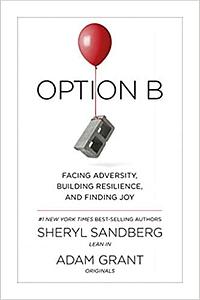Take a photo of a barcode or cover
A very good book combining a memoir of recovering from the death of a loved one with strong social science research and solid advice for building resilience, not just in the face of grief, but more broadly. I work with college students, and this is one of the biggest issues we face, this fear that if something goes wrong, the world will end. Using failure or tragedy as a springboard to accomplish other things in your life is so important. Sandberg's and Grant's take on this is so wise and well-suited for a broad audience. I read some of the reviews, and think the digs about privilege are utterly undeserved here. Sandberg acknowledges that she had advantages due to income and professional stature and the unique bubble in which she works at Facebook, and argues persuasively that we need a serous shift in public policy when it comes to humans in the workplace facing catastrophic loss. And though she did have some advantages, her advice is sound for those who do not enjoy the same advantages as her. Is it okay for most people to cry in the workplace? No. Do I know a single manager who would penalize someone for crying in the workplace after losing a loved one? No. And I have been managing people in very conservative workplaces, and working with others who do, for a long time. I am grateful to Sandberg for tuning me onto research that will be helpful in creating programming and policy for students at the institution for which I work, and for helping me to think more broadly about resilience, friendship, family, and love of self and others.
This book is an interesting compilation of personal experiences, shared stories, and scientific studies about grief and progress. Sheryl Sandberg’s story of how she has dealt with the death of her husband is very emotional and touching, so I recommend this book for anyone dealing with tragedy. I understand why the studies, statistics, and social critique were included, but they did pull me out of the feel of the book.
Life changing. I owe a lot to the wisdom in this book. It helped me get through the worst year of my life. Forever grateful to [a:Sheryl Sandberg|5333595|Sheryl Sandberg|https://images.gr-assets.com/authors/1492801158p2/5333595.jpg] for her courage, tenacity and vulnerability. The findings, experience and research she shares in this book are accessible and well presented. I don't know if I would have had the support or resources to do this for myself -- and therefore, I am grateful to her for writing this book and helping people like me who needed this but may not have been able to do this work for ourselves as efficiently or as quickly as is now possible through this book ...
I see myself returning to this book over and over again in the future ... there is a lot that is good in it ... a powerful story and one of the best books I have ever read. Thank you ....
I see myself returning to this book over and over again in the future ... there is a lot that is good in it ... a powerful story and one of the best books I have ever read. Thank you ....
There's a lot of honesty and transparency around extreme grief and trauma from death/loss and recovery, and a lot of studies etc. cited and tied in, but ultimately super unrelatable - "lessons" from a super wealthy/significantly privileged person whose unique situation (processing with boss Zuckerburg, empathizing with Elon Musk, etc) feels good and almost insightful to read about but when packaged as advise is pretty condescending and confusing.
Good advice about resilience. Nothing earth shattering or brilliant here, but helpful.
The whole time I read it as .. " I me and myself" and a lot of privilege mixed in within it.
The title, main and sub, is really what caught my attention. And in the last lines of the introduction I was all in for reading on, ""Option A is not available. So let's just kick the shit out of Option B." Indeed.
Sheryl Sandberg was thrown under the bus of Option A and run over. When it had done its damage and moved on, all that was left was Option B. She graciously shares the lessons she has learned and is continuing to learn about living Option B to its absolute fullest. Adam Grant was an integral part of Sheryl's quest to live Option B and so he is present in this book - behind the scenes. His stories and his insights are shared through Sheryl's voice. There were so many good and solid points that I'm having a hard time highlighting them for the sake of a review. It definitely gave me some things to think on and consider and implement into my own vocabulary and forward motion.
Sheryl Sandberg was thrown under the bus of Option A and run over. When it had done its damage and moved on, all that was left was Option B. She graciously shares the lessons she has learned and is continuing to learn about living Option B to its absolute fullest. Adam Grant was an integral part of Sheryl's quest to live Option B and so he is present in this book - behind the scenes. His stories and his insights are shared through Sheryl's voice. There were so many good and solid points that I'm having a hard time highlighting them for the sake of a review. It definitely gave me some things to think on and consider and implement into my own vocabulary and forward motion.
This was recommended by a friend, and I did find it helpful but a bit too reliant on anecdotes. I liked the advice about resilience and will try to apply it to my life, but I have to say that I didn't find the book particularly relatable. Her advice that it's okay to cry at work or lose it in public may have worked for her (and I am so, so glad that it did!) but is not an option for me (or I would imagine many others.) Her financial stability is also something that merits mentioning-- most of us are not nearly as comfortable nor have nearly as much access to grief counseling, family members nearby, supportive bosses, etc. My job (and most!) gives 2 days of bereavement leave, to say nothing about all of the tasks that have to be completed in addition to grief-- bills; funeral expenses; closing accounts; changing names on mortgages; you name it. I am glad that she wrote this book, but I agree with other reviewers that the target audience is perhaps a bit narrow.
Started out pretty well with some good advice and anecdotes about grieving and such but then just turned into name dropping and other statistics that didn’t belong in this book. Like another reviewer said, it’s almost a little hard to feel sorry for her after mentioning so many famous names and how many people and how much money she had to get through her husband’s death. Not for me.
Be sad about your crisis but not too sad. Life goes on to option B. Other people, including corporate culture could be more helpful to those who are healing.
That was the bulk of it.
That was the bulk of it.



